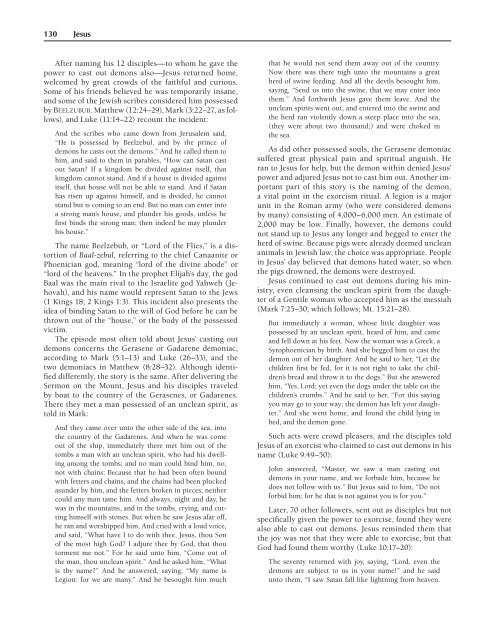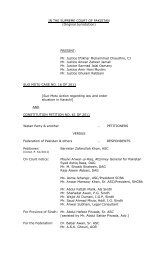The Encyclopedia Of Demons And Demonology
The Encyclopedia Of Demons And Demonology
The Encyclopedia Of Demons And Demonology
Create successful ePaper yourself
Turn your PDF publications into a flip-book with our unique Google optimized e-Paper software.
130 Jesus<br />
After naming his 12 disciples—to whom he gave the<br />
power to cast out demons also—Jesus returned home,<br />
welcomed by great crowds of the faithful and curious.<br />
Some of his friends believed he was temporarily insane,<br />
and some of the Jewish scribes considered him possessed<br />
by BEELZUBUB. Matthew (12:24–29), Mark (3:22–27, as follows),<br />
and Luke (11:14–22) recount the incident:<br />
<strong>And</strong> the scribes who came down from Jerusalem said,<br />
“He is possessed by Beelzebul, and by the prince of<br />
demons he casts out the demons.” <strong>And</strong> he called them to<br />
him, and said to them in parables, “How can Satan cast<br />
out Satan? If a kingdom be divided against itself, that<br />
kingdom cannot stand. <strong>And</strong> if a house is divided against<br />
itself, that house will not be able to stand. <strong>And</strong> if Satan<br />
has risen up against himself, and is divided, he cannot<br />
stand but is coming to an end. But no man can enter into<br />
a strong man’s house, and plunder his goods, unless he<br />
first binds the strong man; then indeed he may plunder<br />
his house.”<br />
<strong>The</strong> name Beelzebub, or “Lord of the Flies,” is a distortion<br />
of Baal-zebul, referring to the chief Canaanite or<br />
Phoenician god, meaning “lord of the divine abode” or<br />
“lord of the heavens.” In the prophet Elijah’s day, the god<br />
Baal was the main rival to the Israelite god Yahweh (Jehovah),<br />
and his name would represent Satan to the Jews<br />
(1 Kings 18; 2 Kings 1:3). This incident also presents the<br />
idea of binding Satan to the will of God before he can be<br />
thrown out of the “house,” or the body of the possessed<br />
victim.<br />
<strong>The</strong> episode most often told about Jesus’ casting out<br />
demons concerns the Gerasene or Gadarene demoniac,<br />
according to Mark (5:1–13) and Luke (26–33), and the<br />
two demoniacs in Matthew (8:28–32). Although identified<br />
differently, the story is the same. After delivering the<br />
Sermon on the Mount, Jesus and his disciples traveled<br />
by boat to the country of the Gerasenes, or Gadarenes.<br />
<strong>The</strong>re they met a man possessed of an unclean spirit, as<br />
told in Mark:<br />
<strong>And</strong> they came over unto the other side of the sea, into<br />
the country of the Gadarenes. <strong>And</strong> when he was come<br />
out of the ship, immediately there met him out of the<br />
tombs a man with an unclean spirit, who had his dwelling<br />
among the tombs; and no man could bind him, no,<br />
not with chains: Because that he had been often bound<br />
with fetters and chains, and the chains had been plucked<br />
asunder by him, and the fetters broken in pieces; neither<br />
could any man tame him. <strong>And</strong> always, night and day, he<br />
was in the mountains, and in the tombs, crying, and cutting<br />
himself with stones. But when he saw Jesus afar off,<br />
he ran and worshipped him, <strong>And</strong> cried with a loud voice,<br />
and said, “What have I to do with thee, Jesus, thou Son<br />
of the most high God? I adjure thee by God, that thou<br />
torment me not.” For he said unto him, “Come out of<br />
the man, thou unclean spirit.” <strong>And</strong> he asked him, “What<br />
is thy name?” <strong>And</strong> he answered, saying, “My name is<br />
Legion: for we are many.” <strong>And</strong> he besought him much<br />
that he would not send them away out of the country.<br />
Now there was there nigh unto the mountains a great<br />
herd of swine feeding. <strong>And</strong> all the devils besought him,<br />
saying, “Send us into the swine, that we may enter into<br />
them.” <strong>And</strong> forthwith Jesus gave them leave. <strong>And</strong> the<br />
unclean spirits went out, and entered into the swine and<br />
the herd ran violently down a steep place into the sea,<br />
(they were about two thousand;) and were choked in<br />
the sea.<br />
As did other possessed souls, the Gerasene demoniac<br />
suffered great physical pain and spiritual anguish. He<br />
ran to Jesus for help, but the demon within denied Jesus’<br />
power and adjured Jesus not to cast him out. Another important<br />
part of this story is the naming of the demon,<br />
a vital point in the exorcism ritual. A legion is a major<br />
unit in the Roman army (who were considered demons<br />
by many) consisting of 4,000–6,000 men. An estimate of<br />
2,000 may be low. Finally, however, the demons could<br />
not stand up to Jesus any longer and begged to enter the<br />
herd of swine. Because pigs were already deemed unclean<br />
animals in Jewish law, the choice was appropriate. People<br />
in Jesus’ day believed that demons hated water, so when<br />
the pigs drowned, the demons were destroyed.<br />
Jesus continued to cast out demons during his ministry,<br />
even cleansing the unclean spirit from the daughter<br />
of a Gentile woman who accepted him as the messiah<br />
(Mark 7:25–30, which follows; Mt. 15:21–28).<br />
But immediately a woman, whose little daughter was<br />
possessed by an unclean spirit, heard of him, and came<br />
and fell down at his feet. Now the woman was a Greek, a<br />
Syrophoenician by birth. <strong>And</strong> she begged him to cast the<br />
demon out of her daughter. <strong>And</strong> he said to her, “Let the<br />
children first be fed, for it is not right to take the children’s<br />
bread and throw it to the dogs.” But she answered<br />
him, “Yes, Lord; yet even the dogs under the table eat the<br />
children’s crumbs.” <strong>And</strong> he said to her, “For this saying<br />
you may go to your way; the demon has left your daughter.”<br />
<strong>And</strong> she went home, and found the child lying in<br />
bed, and the demon gone.<br />
Such acts were crowd pleasers, and the disciples told<br />
Jesus of an exorcist who claimed to cast out demons in his<br />
name (Luke 9:49–50):<br />
John answered, “Master, we saw a man casting out<br />
demons in your name, and we forbade him, because he<br />
does not follow with us.” But Jesus said to him, “Do not<br />
forbid him; for he that is not against you is for you.”<br />
Later, 70 other followers, sent out as disciples but not<br />
specifically given the power to exorcise, found they were<br />
also able to cast out demons. Jesus reminded them that<br />
the joy was not that they were able to exorcise, but that<br />
God had found them worthy (Luke 10:17–20):<br />
<strong>The</strong> seventy returned with joy, saying, “Lord, even the<br />
demons are subject to us in your name!” and he said<br />
unto them, “I saw Satan fall like lightning from heaven.












